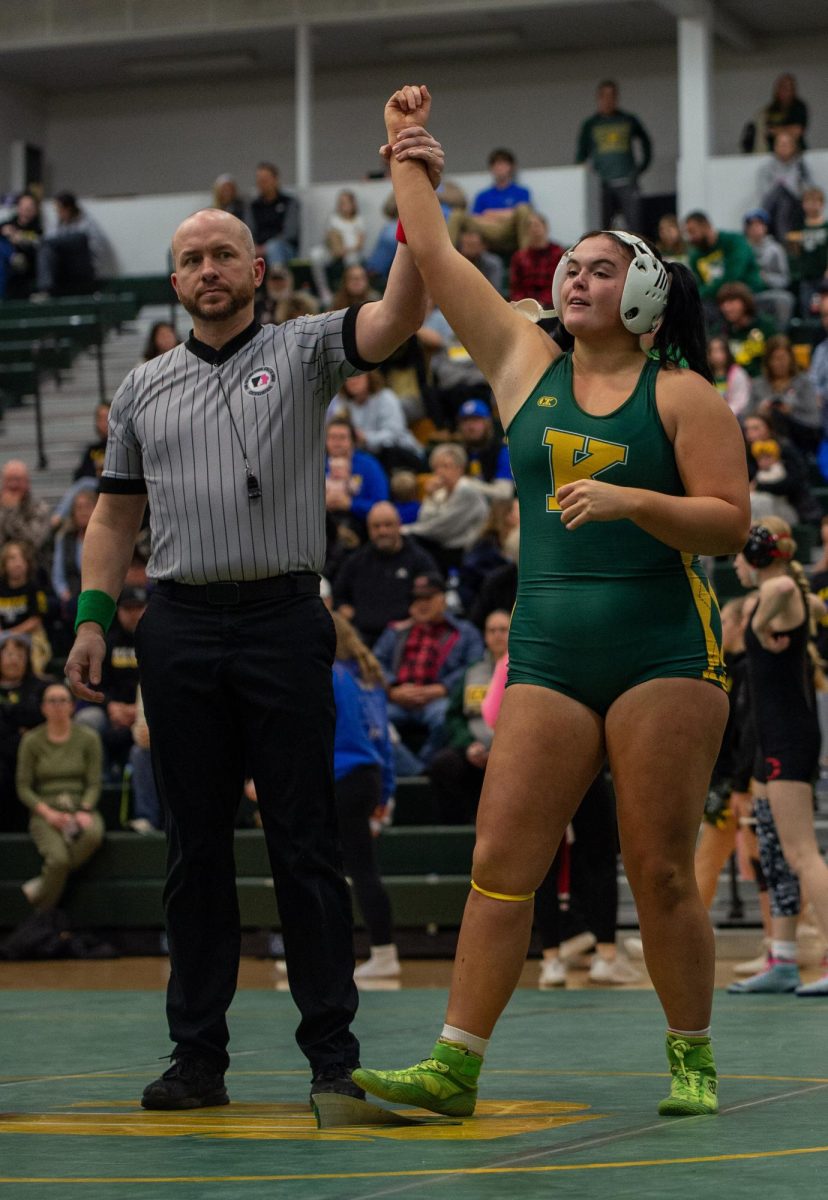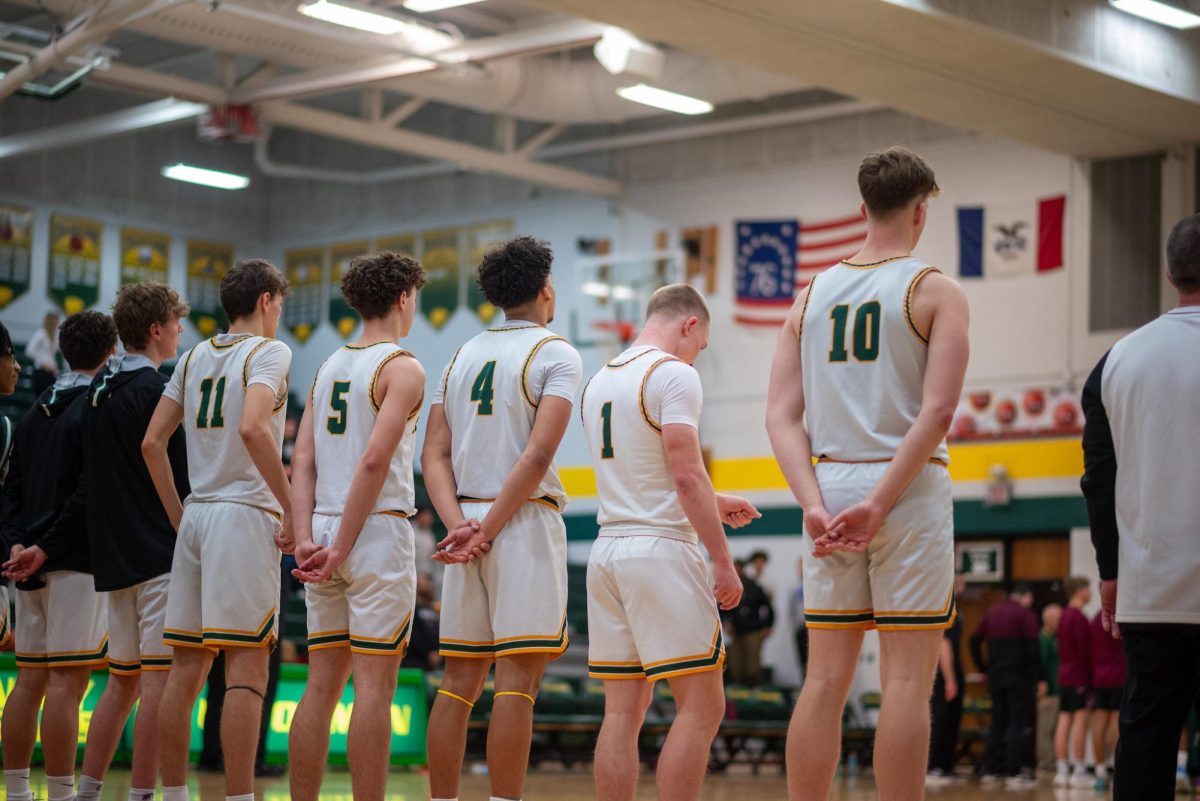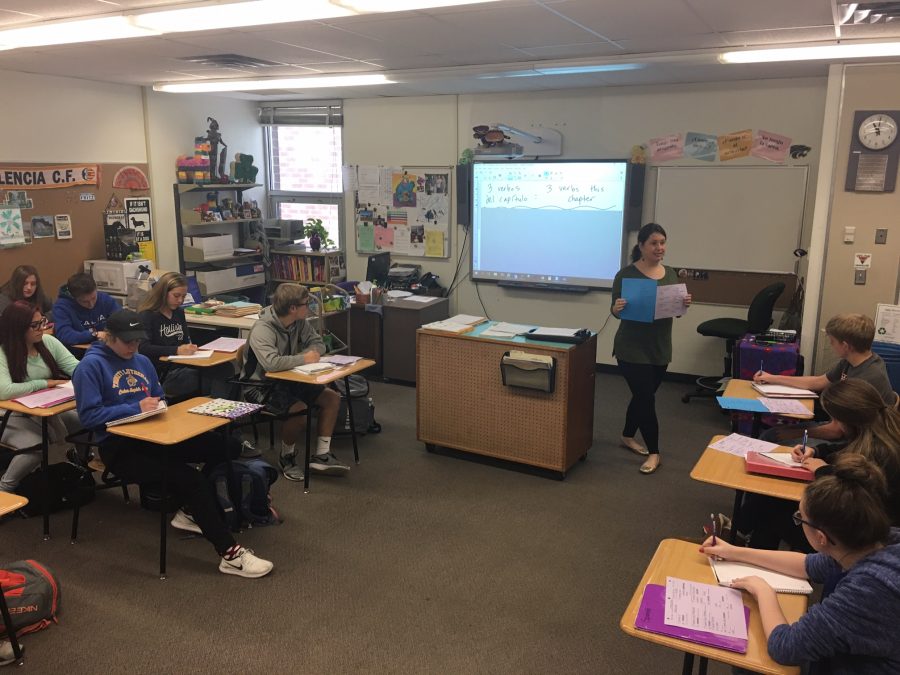A Day in a Teacher’s Life
Spanish class during a regular school day schedule.
November 12, 2018
Most students are quick to make assumptions about teachers. It could be the amount of homework they give, their teaching style, or something else. But there’s always something. However, do we really know 100 percent what teachers go through on a day-to-day basis? Do we know how much work they put in, what goes on in the teachers’ lounge, or why they deal with snobby teens like us? The honest answer to that would most likely be no. So I set out to find the answers to all of the questions we might have regarding the day in the life of a teacher.
I’ve always had good relationships with my teachers, spanning back to elementary school. While most kids don’t give it too much thought, I started to wonder what teachers did during their day. When I got to high school, I realized teachers were always planning, always grading, only really stopping to eat.
“I’m always going,” Senora Neilly said. “I bring work home with me every night and every weekend. If it’s not physical papers, I’m constantly thinking about the next day’s lesson plans, or something else.” That being said, I don’t think that ‘only stopping to eat’ would be a stretch.
In the mornings, I would be walking down the hall and see a sweaty teacher, speed walking by me in order to beat the morning rush. I would be sitting in the middle IMC, eating lunch even though we couldn’t have food down there, and constantly see teachers going up and down the stairs, or in and out the entrance to the Middle IMC, to the copy room.
It seems as though the source of most teachers’ problems is the dreaded copy room.
Of course, that’s not nearly the end of the struggle for a teacher. They have to plan their days, every day, for six different classes. Neilly says that having only one planning period per day isn’t nearly enough.
“Plus, Kennedy has SMART time, so we have to plan for that, too,” Neilly said.
I also spoke to Mrs. Kaspar, who teaches AP Lang and LA 9, about her teaching style and how she goes about getting the material across to her students.“I think it’s different for all of my classes, but for AP, the College Board has certain standards. However, I get to choose the essays that the class reads, and I try to choose ones that are relevant to current news and my students.”
This year I have several release hours, and I started to get bored during my third hour because I couldn’t leave campus without being late for my fourth hour. I had Senora Neilly for two years as a teacher, and I decided that I wanted to be a teacher’s assistant for her. I was super excited to start, and it was extremely interesting to see her work in an outsider perspective. This position also allowed me to gain a lot of insight that not a lot of people had the opportunity to get. Most days, I sit and grade papers, write them down, basically help with whatever Neilly needs. While I’m doing this, Senora is, obviously, teaching her class. But instead of sitting in a desk listening to her lesson, I’m watching her give the lesson. And I notice that she does the things she does for a specific reason.
She would say, “Class get out ___ and work on ___ side until number ___.”
The class would let out a collective sigh, but in reality, this was their preparation for the vocab quiz they would take on Friday. In my time as a TA, I’ve seen Senora lose her Super Teacher composure several times. I’ve seen her doubt the way she’s teaching based on student performance and seen her have (little) meltdowns about how to fix it.
After observing the good, the bad, and the ugly during 3rd hour, something in my brain clicked: teachers don’t maliciously throw assignments, or quizzes, or tests at us just because they can. Their end goal is to help us learn. Of course, I always knew this in the back of my mind, but now I could see it and see the thought process of a teacher who was only trying to help her students learn.
Like I said, most students don’t take the time to think about what teachers do for us, and all the work they put in. Students only think about their grades, and their performance, placing blame on teachers if it doesn’t work out in their favor. I know not all students do this, but I’ve seem my fair share of those who do.
Neilly pointed out that both parents and students alike don’t realize the work teachers put in because the best teachers are the ones who hide it so well. Honestly, I think this is the best way to describe what teachers go through. Teachers know what they sign up for, and they put in the work because they know that they’re helping students in some way, shape, or form. They force themselves to hide the stress because they know that their students’ successes will make the stress worth it.
While of course a teacher’s main focus is to teach, they do a lot of the things we students do. Teachers gossip in the teacher’s lounge, they have friends throughout the school that they go to for advice, and they go through a lot of stress, just like us. Obviously, they’re the ones getting paid, but they chose this job to help shape young minds, and it’s time we start appreciating it.




























Ariel Martinez • Sep 16, 2021 at 9:31 am
In my opinion, i feel like us as students tend to quickly judge the way teachers are. It’s like as soon as we meet a teacher, we’re so quick to say, “I already know she/he is mean” or “I’m not going to like this teacher.” Us students are quite frankly mean when it comes to meeting new teachers and instantly judging them even when we haven’t met their full potential of the kind of person that they are. It’s something us students need to be more respectful and open about. Lately, in this generation that we live in i feel as if students don’t care if they are mean to teachers or disrespectful. Past generations use to get whooped and beat if they were disrespectful towards teachers but now we don’t.
Zoey macias • Sep 14, 2021 at 12:55 pm
This is very true or at least i would like to think it is. As we students complain over assignment and test we never really took into consideration of what the teachers go through. Such as late nights to make those plans or future plans for the next weekend or, even later nights grading papers.Teachers work so hard and never get noticed for it. not even a simple Thank you, for helping me better understand or helping me get a better knowledge of things. We never take in count that when we do bad on assignment or test that it may affect the teacher. Because its our grade why do they care? right. Wrong they care as much as we should but, it does affect them as much. I believe that when this happens teachers believe that they need to find another way so we better understand or. They are failing not only o teaching but to their students for not helping student understand because, at the end of the class period and year all the teachers want is for their student to better understand everything and make it not so boring. Maybe next time someone goes to class they take into consideration that the teachers don’t just give us things to do just so they can get paid but, to help the future of the world. From now on from this point on we as students can actually try because at the and of the day it also affects the teacher.